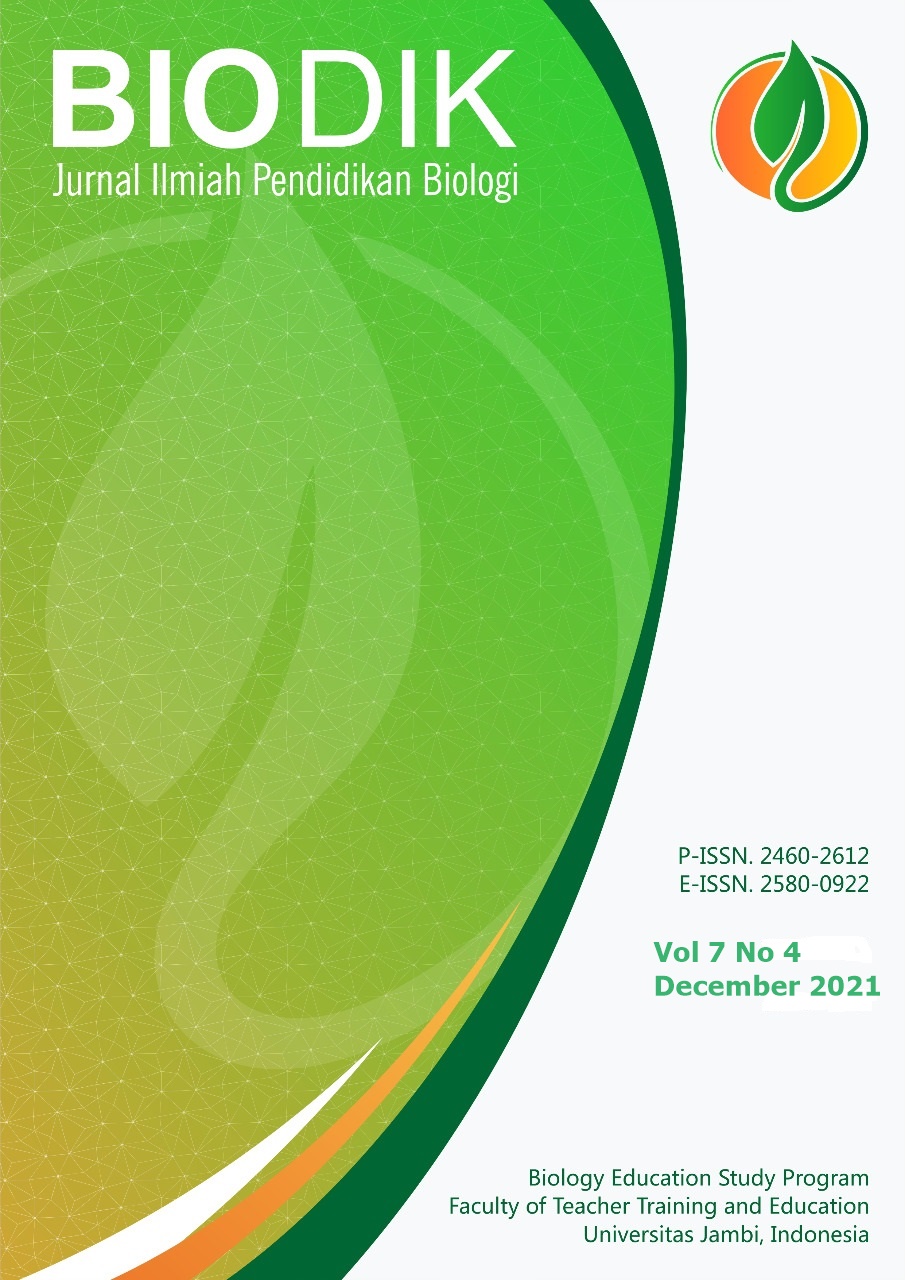Analisis Desain Kegiatan Laboratorium Pertumbuhan dan Perkembangan Tumbuhan
(Design Analysis of Plant Growth and Development Laboratory Activities)
DOI:
https://doi.org/10.22437/bio.v7i4.13089Abstract
The Industrial Revolution 4.0 or The Fourth Industrial Revolution (4IR) is a concept of developing education through the use of technological developments. The quality of education must be continuously improved through the transformation of the educational paradigm which emphasizes learning oriented to higher order thinking skills or often referred to as Higher Order Thinking Skills. One way to improve the quality of education is practicum activities using practicum Student Worksheets (LKS). This study aims to provide an overview of the problems of blood structure practicum worksheets in high school. This research is a qualitative descriptive study and the subject of this research is the worksheets of blood structure practicum. The sampling technique used was total sampling, the sample consisted of 6 LKS. The instruments used include relevance analysis instruments, competency analysis and practical analysis as well as knowledge construction analysis. Based on the results of the analysis and trial of the work steps on one of the DKL regarding the material for plant growth and development, several shortcomings were found. These shortcomings are found in the work steps, tools and materials used and the presentation of observational data for most of the DKL. The reconstruction of DKL produces alternatives to DKL for plant growth and development by considering and completing the shortcomings of the analysis results from DKL that have been analyzed. This DKL reconstruction is expected to be able to construct students' knowledge well through practical activities carried out and be able to get 4C skills or 21st century skills needed today.
Abstrak. Revolusi Industri 4.0 atau The Fourth Industrial Revolution (4IR) merupakan konsep pengembangan pendidikan melalui pemanfaatan perkembangan teknologi. Mutu pendidikan harus terus ditingkatkan melalui transformasi paradigma pendidikan yang menekankan pada pembelajaran berorientasi keterampilan berpikir tingkat tinggi atau sering disebut dengan Higher Order Thinking Skills. Salah satu cara untuk meningkatkan kualitas pendidikan yaitu dengan kegiatan praktikum menggunakan Lembar Kerja Siswa (LKS) praktikum. Penelitian ini bertujuan untuk memberikan gambaran mengenai permasalahan LKS praktikum struktur darah di SMA. Penelitian ini merupakan penelitian deskriptif kualitatif dan subjek penelitian ini adalah LKS praktikum struktur darah. Teknik sampling yang digunakan yaitu total sampling, sampel terdiri dari 6 LKS. Instrumen yang digunakan meliputi instrumen analisis relevansi, analisis kompetensi dan analisis praktikal serta analisis konstruksi pengetahuan. Berdasarkan hasil analisis dan uji coba Langkah kerja terhadap salah satu DKL. mengenai materi pertumbuhan dan perkembangan tumbuhan ditemukan beberapa kekurangan. Kekurangan tersebut didapatkann pada langkah kerja, alat dan bahan yang digunakan serta penyajian data pengamatan Sebagian besar DKL. Rekontruksi DKL menghasilkan alternatif DKL pertumbuhan dan perkembangan tumbuhan dengan mempertimbangkan dan melengkapi kekurangan hasil analisis dari DKL yang sudah di analisis. Rekontruksi DKL ini diharapkan mampu mengkontruksi pengetahuan peserta didik dengan baik melalui kegiatan praktikum yang dilakukan serta mampu mendapatkan keterampilan 4C atau keterampilan abad 21 yang dibutuhkan saat ini.
Downloads
References
Abraham, I., & Millar, R. (2008). Does Practical Work Really Work? A Study of the Effectveness of Prcatical Work as a Teaching and Learning Method in School Science. International Journal of Science Education.
Fadzil, H. ., & Saat, R. . (2020). Exploring Secondary School Biology Teachers’ Competency in Practical
Work. Jurnal Pendidikan IPA Indonesia, 9(1).
Hamidah, A., Sari, E. N., & Budianingsih, R. S. (2014). Persepsi Siswa tentang Kegiatan Praktikum Biologi di Laboratorium SMA Negeri se-Kota Jambi. Jurnal Sainmatika, 8(1).
Millar, R. (2004). The role of practical work in the teaching and learning of science. National Academi of Science.
Muhali. (2018). Arah Pengembangan Pendidikan Masa Kini Menurut Perspektif Revolusi Industri 4.0. Seminar Nasional Lembaga Penelitian Dan Pendidikan (LPP) Mandala. Novak, J.., & Gowin, D.. (1985). Learning How to Learn. Cambridge: Cambridge University Press
Sunarno, W. (2018). Pembelajaran IPA di Era Revolusi Industri 4.0. Madiun
Turner, F., Brownhill, S., & Wilson, E. (2017). The transfer of content knowledge in a cascade model of professional development. Teacher Development, 21(2), 175–191
Turner, F., Brownhill, S., & Wilson, E. (2017). The transfer of content knowledge in a cascade model of professional development. Teacher Development, 21(2), 175–191.
Wahidah, N. S., Supriatno, B., & Kusumastuti, M. N. (2018). Analisis Struktur dan Kemunculan Tingkat Kognitif pada Desain Kegiatan Laboratorium Materi Fotosintesis. Indonesian Journal of Biology Education, 1(2). Winkel, W. . (1996). Psikologi Pengajaran. Jakarta: Erlangga.
Downloads
Published
How to Cite
Issue
Section
License
Copyright (c) 2021 Trisna Dewi, Sri Anggraeni, Bambang Supriatno

This work is licensed under a Creative Commons Attribution-NonCommercial-ShareAlike 4.0 International License.
Copyright Notice
Authors who publish with Biodik : Jurnal Ilmiah Pendidikan Biologi agree to the following terms:
- For all articles published in Biodik : Jurnal Ilmiah Pendidikan Biologi, copyright is retained by the authors and grant the journal right of first publication with the work simultaneously licensed under a Creative Commons Attribution-ShareAlike 4.0 International Licensethat allows others to share the work with an acknowledgment of the work's authorship and initial publication in this journal.
- Authors are able to enter into separate, additional contractual arrangements for the non-exclusive distribution of the journal's published version of the work (e.g., post it to an institutional repository or publish it in a book), with an acknowledgment of its initial publication in this journal.
- Authors are permitted and encouraged to post their work online (e.g., in institutional repositories or on their website) prior to and during the submission process, as it can lead to productive exchanges, as well as earlier and greater citation of published work (See The Effect of Open Access).
















